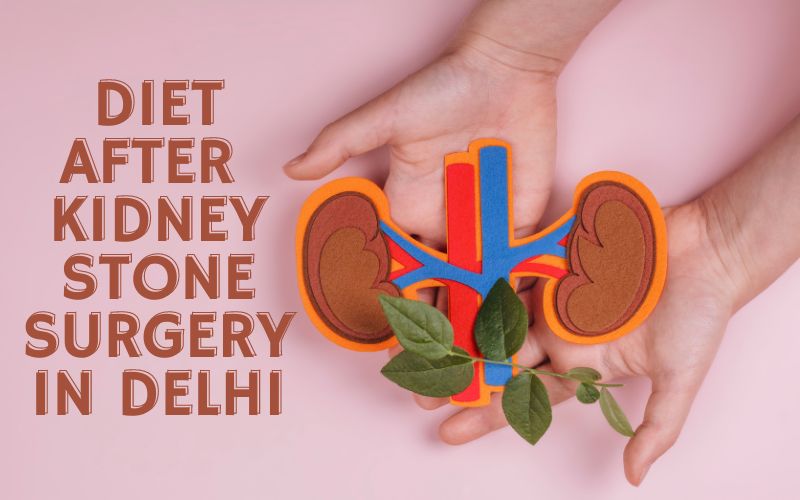Kidney stones, medically called renal calculi, are crystallized deposits form in the kidneys and cause excruciating pain, urinary tract obstruction, and other problems in the body. While many kidney stones pass spontaneously through the urinary tract, some require surgery for removal. Kidney stone surgery, also known as lithotripsy or stone extraction surgery, is a specialised surgery for eliminating stones. Nephrologist at Madhuban Kidney Care, reputed kidney hospital in Delhi, help patients get relief quickly through a successful surgery. In this article, the stone removal surgery is explained in simple terms with the recommended general diet prescribed after surgery.
Types of Kidney Stone Surgery in Delhi
Kidney stone surgery consists many procedure types for stone removal :
- Extracorporeal Shock Wave Lithotripsy (ESWL): ESWL is a surgery procedure which don’t require cuts, uses shock waves to break down kidney stones into smaller fragments, which can then pass through the urinary tract more easily. During the procedure, the patient lies on a table, and shock waves are directed at the kidney stones from outside the body. ESWL is typically recommended for small to medium-sized kidney stones located in the kidney or upper urinary tract.
- Percutaneous Nephrolithotomy (PCNL): PCNL is a stone surgery used to remove larger sized kidney stones or stones that are not amenable to ESWL. During PCNL, a small cut is made somewhere around on the back, and a nephroscope (a thin, flexible instrument with a camera) is inserted directly into the kidney to visualize and remove the stones. PCNL is effective for large or complex kidney stones and causes a minimal pain with short recovery time.
- Ureteroscopy Kidney stone surgery(URS): URS is a surgery procedure with minimum cuts which is used to remove kidney stones located in the ureter (the tube that connects the kidney to the bladder). During URS, a thin, flexible scope called a ureteroscope is inserted through the urethra and bladder into the ureter. The stones are then assessed and removed using instruments passed through the ureteroscope. URS is particularly for treating small to medium-sized stones in the lower urinary tract and has high success rates with less complications.
- Open Surgery: In rare cases open surgery is performed to remove kidney stones. Open surgery involves making a larger cut in the abdomen or back to access the kidneys directly. While open surgery is effective for removing large or complex stones, it is associated with longer hospital stays, heavy pain, and higher risk of complications compared to above surgeries.
What are the important indications for which kidney stone surgery is a must?
Kidney stone surgery is recommended in the following situations:
- Large kidney stones that are unlikely to pass spontaneously.
- Persistent or recurrent symptoms despite medicines and other treatments.
- Stones causing urinary tract obstruction, kidney damage, or infection.
- Inability to tolerate pain or complications associated with kidney stones.
What are the diet and avoidance after kidney stone removal surgery in Delhi?
Here’s a general guideline on diet post-kidney stone surgery in Delhi:
- Hydration: Adequate hydration to prevent the formation of kidney stones. Drink plenty of fluids, preferably water, throughout the day. Aim for at least 2-3 liters of water per day, or as advised.
- Limit Sodium Intake: High sodium intake can increase the risk of kidney stones. Avoid adding extra salt to your meals and lower the consumption of processed and packaged foods.
- Calcium Intake: Calcium from food sources actually help reduce the risk of calcium oxalate stones. Include sources of calcium in your diet such as dairy products (milk, yogurt, cheese), tofu, almonds, and green leafy vegetables.
- Moderate Oxalate Intake: Oxalate is found in plant foods and cause formation of calcium oxalate stones. While don’t completely eliminate high-oxalate foods from your diet, it’s advisable to consume them in moderation. Examples of high-oxalate foods include spinach, beets, nuts, tea, and chocolate.
- Adequate Fiber: Consuming dietary fiber prevent constipation, which is a risk factor for kidney stone formation. Include plenty of fruits, vegetables, whole grains, and legumes in your diet to ensure an adequate fiber intake.
- Limit Protein: High protein intake, particularly animal protein, increase the risk of kidney stones, especially uric acid stones. Incorporate plant-based protein sources such as beans, lentils, tofu, and nuts into your meals.
- Limit Beverages: Beverages, such as certain types of tea (e.g., black tea), and certain fruit juices (e.g., cranberry juice), are high in oxalate. Limit consumption for individuals prone to calcium oxalate stones.
- Excessive sugar intake, especially from beverages and processed foods, leads to obesity and metabolic conditions like kidney stones.
- Healthy Fats: Choose healthy fats such as those found in nuts, seeds, avocados, and olive oil. Avoid trans fats and limit saturated fats, which are found in fried and processed foods.
Please note that it is a generic diet which can vary from patient to patient. It is advised to only follow the diet as per your kidney doctor.
The kidney stone removal surgery is a highly effective treatment solution for patients suffering. Madhuban Kidney Care, kidney hospital in Delhi, you get surgery expertise, high end operational equipment’s, monitoring and compassionate care suffering from kidney stones. Whether it be through ESWL, PCNL, URS, or open surgery, our urologists make sure you get proper treatment and healing in less time.


